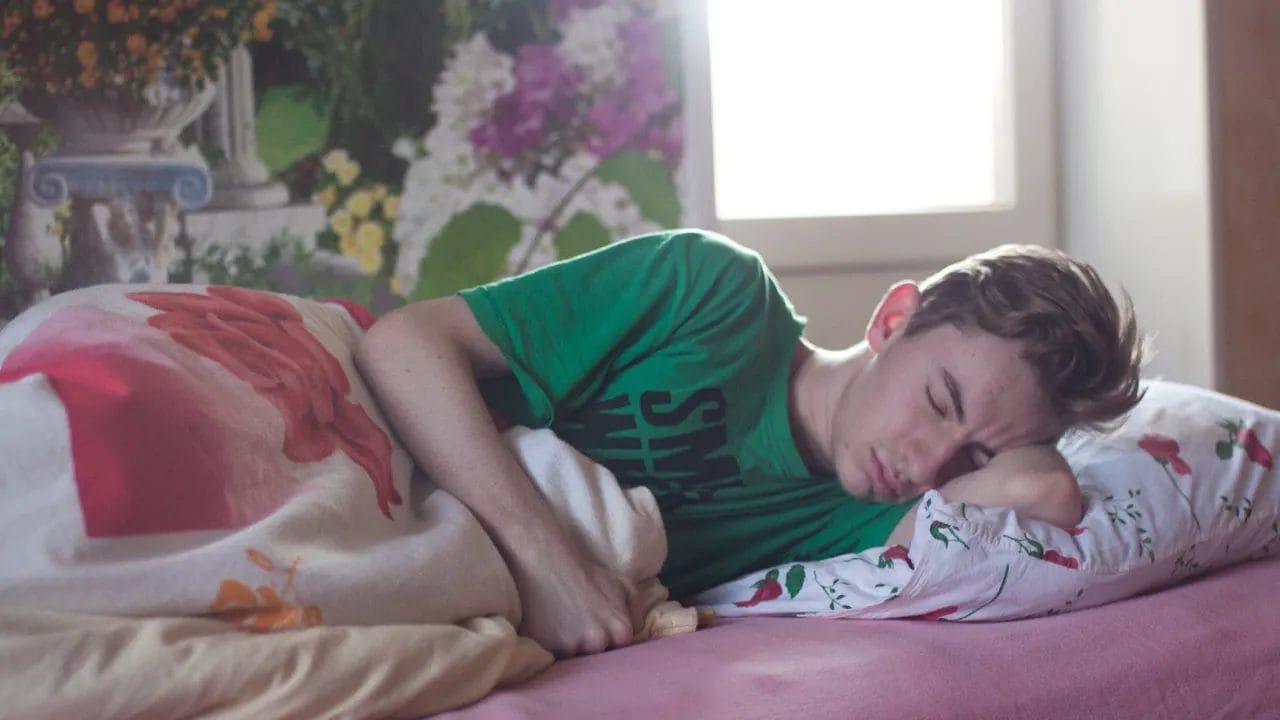The Strange Phenomenon of Whistling While You Sleep: What Causes It?
Have you ever been startled awake by the sound of whistling in the middle of the night, only to find that no one else in the room is making a sound? This strange phenomenon, known as whistling while you sleep, has puzzled scientists and researchers for years.
In this article, we will delve into the fascinating world of sleep sounds and explore the causes behind this mysterious occurrence.

Understanding the Basics of Sleep Sounds
Before we can delve into the specifics of whistling while sleeping, let’s first gain a basic understanding of sleep sounds. When we sleep, our bodies go through different stages of sleep, each with its own unique characteristics. During these stages, our brains produce an array of sounds, ranging from gentle murmurs to loud snores.
These sleep sounds are, for the most part, completely normal and harmless. In fact, they often go unnoticed by the sleeper themselves. However, in some cases, these sounds can take the form of whistling, creating a puzzling and disruptive experience for both the individual and those around them.
The Science Behind Sleep Noises
To understand why whistling might occur during sleep, it is essential to explore the science behind sleep noises. When we sleep, our muscles relax, including those in the throat and airways. This relaxation can cause the air to flow differently, leading to the production of various sounds, such as snoring or whistling.
Researchers believe that the specific characteristics of these sounds are influenced by factors such as the position of the sleeper, the anatomy of their airways, and the breathing patterns they exhibit during sleep. By studying these variables, scientists hope to uncover the secrets behind the occurrence of whistling while sleeping.
Furthermore, the production of sleep sounds can also be influenced by external factors, such as environmental noise or sleep conditions. For example, sleeping in a room with a high level of ambient noise may contribute to the production of louder sleep sounds, including whistling.
Common Types of Sleep Sounds
Whistling while you sleep is just one example of the many different types of sleep sounds that people may experience. Some individuals may snore, while others might make grunting or gurgling sounds. Additionally, certain sleep disorders can contribute to the production of unusual sleep sounds, such as sleep apnea or restless leg syndrome.
It’s essential to note that the occasional production of sleep noises is generally not a cause for concern. However, if these sounds become persistent and disrupt your quality of sleep, it may be worth consulting with a healthcare professional to rule out any underlying sleep disorders or medical conditions that may be contributing to the problem.
Moreover, the study of sleep sounds has led to the development of innovative technologies aimed at improving sleep quality. For example, there are now devices available that can detect and analyze sleep sounds, providing valuable insights into an individual’s sleep patterns and potential underlying issues.
Researchers are exploring the use of sound therapy as a means of managing sleep sounds. By introducing soothing sounds into the sleep environment, individuals may find relief from disruptive sleep noises, including whistling. These sounds can range from calming nature sounds, such as ocean waves or bird songs, to white noise or pink noise, which can help mask unwanted sounds.
Sleep sounds are a natural part of the sleep cycle, with whistling being just one example. Understanding the science behind these sounds and recognizing the different types can help individuals better manage their sleep experiences. Whether it’s through lifestyle changes, medical interventions, or the use of sound therapy, there are various strategies available to address disruptive sleep sounds and promote a restful night’s sleep.
The Mystery of Whistling While Sleeping
Now that we have explored the basics of sleep sounds let’s focus on the enigma of whistling while sleeping. This phenomenon is often misunderstood and has left both researchers and individuals questioning its origins and implications. Let’s delve deeper into the mystery and shed some light on this unusual occurrence.
Defining the Phenomenon
Whistling while sleeping can be defined as the production of a high-pitched sound resembling a whistle during sleep. This sound is typically created by the movement of air as it passes through narrowed or partially obstructed airways. While it may seem harmless, whistling while sleeping can be a cause of discomfort and restlessness for both the individual experiencing it and anyone sharing their sleep environment.
Prevalence and Perception
Although whistling while sleeping is relatively rare, it is not unheard of. A small percentage of the population has reported experiencing this phenomenon at some point in their lives. It is important to note that the perception of whistling during sleep can vary among individuals.
While some sleepers may be unaware of their whistling, others may be fully conscious of the sound they are producing. The different levels of awareness and perception surrounding whistling while sleeping contribute to the overall complexity of this peculiar phenomenon.
Research studies have shown that whistling while sleeping is more prevalent in certain populations. For example, individuals with sleep apnea, a disorder characterized by pauses in breathing during sleep, are more likely to experience whistling sounds due to the narrowing of their airways. Additionally, factors such as obesity, nasal congestion, and allergies can contribute to the occurrence of whistling while sleeping.
Furthermore, the sound of whistling during sleep can vary in intensity and pitch. Some individuals may produce a faint and sporadic whistle, while others may emit a loud and continuous sound. The reasons behind these variations remain unclear and warrant further investigation.
Interestingly, the perception of whistling while sleeping can also be influenced by external factors. Sleep environment plays a crucial role in the perception of sleep sounds, including whistling. For instance, individuals sleeping in a quiet room may be more likely to notice and be bothered by their own whistling, while those in a noisy environment may not be as aware of the sound.
The impact of whistling while sleeping extends beyond the individual experiencing it. Bed partners or roommates may be disturbed by the sound, leading to disrupted sleep and potential strain in relationships. The effects of whistling while sleeping on the quality of sleep for both the individual and those around them highlight the need for further research and understanding of this intriguing phenomenon.
Whistling while sleeping remains a mysterious occurrence that continues to puzzle researchers and individuals alike. The varying prevalence, perception, and potential impact on sleep quality make it a subject worthy of further exploration. By unraveling the secrets behind this enigmatic phenomenon, we can hope to provide better insights and potential solutions for those affected by whistling while sleeping.
The Role of Breathing in Sleep Whistling
While the exact cause of whistling while sleeping is still under investigation, researchers have identified a strong connection between breathing patterns and the occurrence of sleep sounds. Understanding the role of breathing in sleep whistling is crucial in unraveling the mysteries behind this intriguing phenomenon.
The Anatomy of Breathing During Sleep
During sleep, our breathing patterns naturally change. As we enter deeper stages of sleep, our breathing becomes more rhythmic and slower compared to our wakeful state. This shift in breathing patterns is a result of the brain’s control over the muscles responsible for respiration and is a vital aspect of a healthy sleep cycle.
However, when airways narrow or become partially obstructed, as is the case in whistling while sleeping, this rhythmic flow of air can become disrupted, leading to the production of whistling sounds.
How Breathing Patterns Affect Sleep Sounds
Several factors can contribute to the occurrence of whistling while sleeping, including changes in breathing patterns. For example, sleeping in certain positions, such as on your back, can increase the likelihood of whistling by causing the tongue and soft tissues in the throat to obstruct the airway partially.
Similarly, nasal congestion or allergies can increase resistance in the nasal passages, forcing the air to flow faster and more forcefully, resulting in whistling sounds. Sleep apnea, a condition characterized by pauses in breathing during sleep, can also cause whistling noises as the air attempts to pass through partially obstructed airways.
Potential Causes of Whistling While You Sleep
Now that we have gained a deeper understanding of the role of breathing in the production of whistling sounds during sleep, let’s explore some of the potential causes behind this peculiar phenomenon. Whistling while sleeping can be influenced by a variety of factors, ranging from medical conditions to lifestyle choices.
Medical Conditions and Sleep Whistling
Several medical conditions can contribute to the occurrence of whistling while sleeping. These may include chronic allergies, sinusitis, deviated septum, or anatomical abnormalities in the airways. In some cases, respiratory infections or inflammation can also lead to temporary whistling sounds during sleep.
If you suspect that an underlying medical condition is causing your sleep whistling, it is crucial to consult with a healthcare professional for an accurate diagnosis and appropriate treatment plan.
Lifestyle Factors and Sleep Sounds
In addition to medical conditions, certain lifestyle factors can influence the occurrence of whistling while sleeping. Smoking, for example, can irritate the airways and contribute to inflammation, increasing the likelihood of whistling sounds during sleep.
Furthermore, obesity and excessive weight can put pressure on the airways, causing partial obstructions and whistling sounds. Additionally, certain medications and substances, such as sedatives or alcohol, can relax the muscles in the throat and increase the likelihood of whistling during sleep.

The Impact of Whistling While Sleeping
Whistling while sleeping may seem like a harmless and quirky occurrence, but it can have significant impacts on sleep quality and overall well-being. Let’s explore the effects that whistling during sleep may have on individuals and the broader social and psychological implications.
Effects on Sleep Quality
Whistling sounds during sleep can disrupt the sleep of both the individual experiencing the phenomenon and those sharing the sleep environment. The high-pitched sound can be jarring and cause awakenings throughout the night, leading to fragmented sleep and decreased overall sleep quality.
Consistently disrupted sleep can have a range of negative effects on daytime functioning, including impaired concentration, decreased productivity, and increased daytime drowsiness. Additionally, the lack of restful sleep can contribute to feelings of irritability and fatigue, impacting overall well-being and quality of life.
Social and Psychological Implications
The social and psychological implications of whistling while sleeping should not be underestimated. Individuals who experience this phenomenon may feel embarrassed, anxious, or self-conscious about their sleep sounds, especially if they are disrupting the sleep of their bed partner or roommates.
The impact on interpersonal relationships can be significant, as the disruptions caused by whistling during sleep can lead to conflicts or strain in shared sleeping environments. Additionally, the anxiety or self-consciousness surrounding sleep sounds can contribute to heightened stress levels and further exacerbate sleep difficulties.
Conclusion
The strange phenomenon of whistling while you sleep remains a fascinating area of investigation. While researchers continue to explore the intricate balance between breathing patterns, anatomy, and sleep sounds, individuals who experience this phenomenon can seek solace in the knowledge that they are not alone.
If you or someone you know struggles with whistling during sleep, it is crucial to consult with a healthcare professional to explore potential underlying causes or contributing factors. By addressing any medical conditions, making necessary lifestyle changes, and implementing strategies to improve sleep quality, individuals can find relief and regain control over their restful nights.
Remember, understanding the causes and impacts of whistling while you sleep is the first step towards finding effective solutions and achieving a peaceful and uninterrupted night’s sleep.


